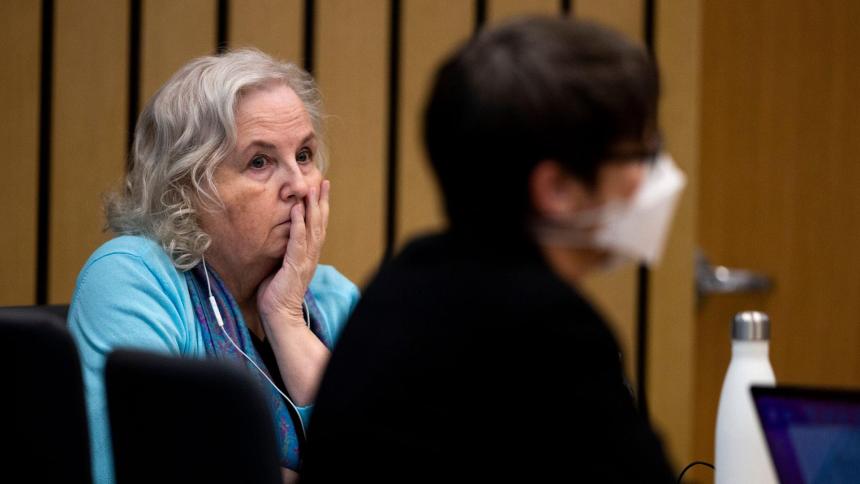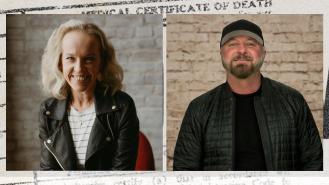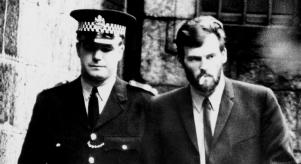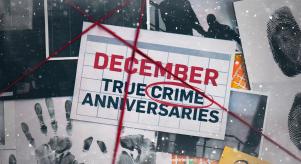
The new true crime podcast that explores a stranger-than-fiction murder
Happily Never After: Dan and Nancy is a gripping new true crime podcast that explores the dark side of married life. A quiet community in suburban Portland, Oregon was rocked in 2018 when Dan Brophy, a popular local chef, was murdered. When Nancy Brophy was arrested on suspicion of her husband’s murder, neighbours were forced to question everything they thought they knew about the couple’s seemingly happy marriage.
Hosted by Heidi Joy Tretheway, a romance novelist and former member of Nancy’s writing group, this podcast dives deep into a case that ended up being stranger than fiction. Using exclusive interviews, recordings and access to evidence, Heidi guides listeners through the twisted tale of love and betrayal.
Crime+Investigation spoke to Heidi to learn more about the podcast, her personal connection to those involved and the strange circumstances surrounding the shocking murder.
Can you give us an overview of the case covered in the podcast?
Dan and Nancy Brophy were living out their golden years in suburban Portland, Oregon, where Dan worked as a culinary instructor and Nancy was an aspiring romance novelist. But what started as a love story became a murder mystery when Dan was found shot dead, and then Nancy was arrested for his murder.
What makes the case shocking is layers of stranger-than-fiction coincidences. Nancy often wrote about murder in her books — especially wives murdering bad husbands. It made people wonder if she confused her fiction with reality and turned her novels’ murder plots into a scheme to kill her own husband.
Why should true crime fans listen to Happily Never After: Dan & Nancy?
True crime really appeals to me because you get to go behind the scenes — you learn what people were really thinking and what was really going on. This podcast series follows the juicy, gossipy twists and turns of the investigation, arrest and trial. If you love true crime for the ‘Can you even believe that’s real?’ surprise, and the intrigue of uncovering evidence and building a case, I think you’ll enjoy this.
Nancy was a fellow author from your local area. What kind of relationship did the two of you have and what was your impression of her?
Nancy was the president of a writing club I joined, the Rose City Romance Writers. I saw Nancy as the queen bee of the group — she was loud and chatty and always at the front of the room, commanding attention.
Several people on the podcast said Nancy thought she was the smartest person in the room. Nancy also dished out plenty of unsolicited advice, even though she was not commercially successful in her own right. At one point, she skewered my new book’s cover that I had brought to show the group.
Were you and other authors in your writing club surprised when you found out she was being investigated for murder?
Shocked doesn’t even cover it! I’d never imagined that I had known a killer. Remember, tons of people rallied in support of Nancy after we learned of Dan’s murder. So to go from grieving widow to murder suspect was something a lot of Nancy’s friends had to wrestle with, and ultimately they made up their own minds about whether she was innocent or guilty. Even after her conviction, some of Nancy’s friends stand by her.

This case gained worldwide media attention because years before Dan’s death, Nancy had written an essay titled, 'How to murder your husband'. Can you tell us what was included in the essay?
In 2011, Nancy authored a blog post, How to Murder Your Husband, that detailed the various motivations and means to kill off an inconvenient spouse. I think she was just using the title as clickbait, because the purpose of the blog, See Jane Publish, which Nancy had started with a handful of friends from our writing group, was to attract readers to their fiction by writing about their real lives.
In the blog post, Nancy’s sass and dark humour are apparent — such as with the line, ‘Husbands have disappeared from cruise ships before. Why not yours?’ Nancy said she showed it to Dan before publishing it and he laughed. Nobody took it seriously.
The blog post was published nearly seven years before Dan’s murder, and I believe that Nancy didn’t have an intention to murder her husband then. But we also can’t deny the fact that her books are full of wives murdering their husbands, and it may have been a fantasy for her. Perhaps she believed that if she could write the perfect murder in a book, she could also orchestrate one in real life.
You’re a romance novelist by trade, so what was it like working on a true crime project for change?
I’ve been a professional writer for 25 years, including working as a crime reporter for a Seattle-area daily newspaper and covering some grisly murders. So the journalistic process of thinking through how to present pieces of evidence and quotes felt very familiar to me. I was eager to contribute to editing and adding perspective to the script, bringing my knowledge of both crime journalism and the romance novelist community to the story.
I’d appeared as a guest on many podcasts, but from a production standpoint, I was a novice. Working with Wondery showed me what top-tier production really looks like, from the multitude of revisions to gorgeous sound design that makes you feel like you’re right there with the police. I worked with a voice coach and producers to get the energy and emotion of telling this story just right, and even learned to be my own sound engineer while recording from my bedroom closet.
How did you go about investigating the case and compiling all the necessary information?
Wondery and The Oregonian collaborated on sourcing all of the interviews for this podcast — and what surprises a lot of people is that they’re all real. We hear from Nancy’s friends and exes, the police and prosecutors, and even tapes from Nancy in jail that have never been heard before. It makes for a really rich, immersive, documentary-style story.
Plus, we dramatised some excerpts from Nancy’s books so listeners could hear how she wrote and what her characters did. Investigators wondered if Nancy’s books might offer clues to the real-life crime.
Are there any interviews that you conducted for this podcast that really stood out to you?
The interviews with Tania Medlin, Nancy’s longtime friend and former roommate, really stand out. You hear her journey from being a supportive friend, to desperately questioning the evidence (or at one point, not wanting to look at it at all), to feeling hurt and used for Nancy’s purposes as a witness for the defence.
I also loved hearing from the prosecutor, Senior Deputy District Attorney Shawn Overstreet. When Nancy took the stand in her own defence, he adjusted his strategy based on the fact that she was willing to talk and talk … she seemed to have a story or answer for everything. Ultimately, I think Nancy’s own testimony convinced the jury she was guilty.
Do you think crime writers might be concerned about how their work is being perceived after this case?
No, I don’t think crime writers truly worry about this. I have plenty of mystery writer friends who joke about their admittedly suspicious computer search histories. But they see digging into grisly details such as corpse decay or bomb assembly as simply part of the job. I think Nancy thought her profession would be an excellent excuse for her actions, from buying guns to searching ‘ten ways to cover up a murder’.
What is another podcast that you would recommend people listen to?
I am hooked on Blame it on the Fame: Milli Vanilli. Like Happily Never After: Dan and Nancy, it’s light on gore and heavy on gossip, and it features the real insiders from the story about that singing group’s rise to fame and fall from grace. The host, Amanda Seales, is spectacular — she feels like a friend spilling the tea in the juiciest way.
Happily Never After: Dan and Nancy is a Wondery production and is available now everywhere you get your podcasts.







